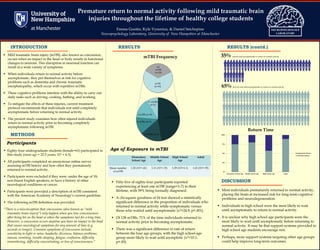
Gootee-Cognitive-Aging-2016
- 1. Emma Gootée, Kyle Vynorius, & Daniel Seichepine Neuropsychology Laboratory, University of New Hampshire at Manchester INTRODUCTION Mild traumatic brain injury (mTBI), also known as concussion, occurs when an impact to the head or body results in functional changes to neurons. This disruption in neuronal function can result in a wide variety of symptoms. When individuals return to normal activity before asymptomatic, they put themselves at risk for cognitive problems such as dementia and chronic traumatic encephalopathy, which occur with repetitive mTBIs. These cognitive problems interfere with the ability to carry out daily tasks such as driving, cooking, bathing, and working. To mitigate the effects of these injuries, current treatment protocol recommends that individuals rest until completely asymptomatic before returning to normal activity. The present study examines how often injured individuals return to normal activity prior to becoming completely asymptomatic following mTBI. METHODS Participants DISCUSSION Most individuals prematurely returned to normal activity, placing the brain at increased risk for long-term cognitive problems and neurodegeneration. Individuals in high school were the most likely to wait until asymptomatic to return to normal activity. It is unclear why high school age participants were the most likely to wait until asymptomatic before returning to normal activity. It may be that support systems provided to high school age students encourage rest. Perhaps, more support systems targeting other age groups could help improve long-term outcomes. Premature return to normal activity following mild traumatic brain injuries throughout the lifetime of healthy college students Eighty-four undergraduate students (female=61) participated in this study (mean age = 22.2 years, SD = 4.3). All participants completed an anonymous online survey assessing mTBI history and how often they prematurely returned to normal activity. Participants were excluded if they were: under the age of 18; non-fluent English speakers; or have a history of other neurological conditions or cancer. Participants were provided a description of mTBI consistent with the American Academy of Neurology’s current guideline. The following mTBI definition was provided: “There is a misconception that concussions (also known as “mild traumatic brain injury”) only happen when you lose consciousness after being hit on the head or when the symptoms last for a long time. However, a concussion occurs anytime you have an impact to the head that causes neurological symptoms for any amount of time (e.g. seconds or longer). Common symptoms of concussion include: sensitivity to light or noise, headache, dizziness, balance problems, nausea, vomiting, trouble sleeping, fatigue, confusion, difficulty remembering, difficulty concentrating, or loss of consciousness.” RESULTS (contd.) Return Time 1 mTBI (n=26) 2 mTBIs (n=9) 3 mTBIs (n=7) 4 mTBIs (n=8) 5+ mTBIs (n=5) mTBI (n=55) no mTBI (n=29) mTBI Frequency Age of Exposure to mTBI Elementary School Age Middle School Age High School Age Adult Mean number of mTBI 1.20 (SD=.41) 1.11 (SD=.33) 1.59 (SD=1.1) 1.65 (SD=.93) RESULTS Fifty-five of eighty-four participants reported experiencing at least one mTBI (range=1-7) in their lifetime, with 59% being formally diagnosed. A chi-square goodness of fit test showed a statistically significant difference in the proportion of individuals who returned to normal activity while symptomatic versus those who waited until asymptomatic (x2=24.9, p<.001). Of 128 mTBIs, 71% of the time individuals returned to normal activity prior to becoming asymptomatic. There was a significant difference in rate of return between the four age groups, with the high school age group more likely to wait until asymptotic (x2=10.1, p<.05). 35% waited until asymptomatic to return to normal activity 65% did not wait until asymptomatic to return to normal activity 0% 25% 50% 75% 100% Elementary School Age Middle School Age High School Age Adult Appropriate Return Premature Return